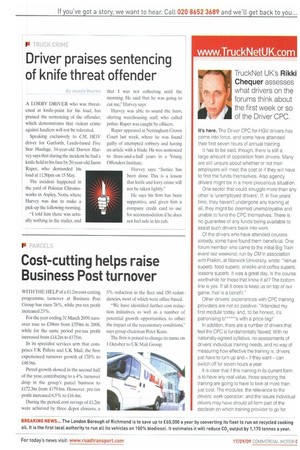www.TruckNetUK.com
Page 9

If you've noticed an error in this article please click here to report it so we can fix it.
TruckNet UK's Rikki Chequer assesses what drivers on the forums think about the first week or so of the Driver CPC.
It's here. The Driver CPC for HGV drivers has come into force, and some have attended their first seven hours of annual training.
It has to be said, though, there is still a large amount of opposition from drivers. Many are still unsure about whether or not their employers will meet the cost or if they will have to find the funds themselves. Also agency drivers might be in a more precarious situation.
One sector that could struggle more than any other is 'unemployed drivers'. If, in five years' time, they haven't undergone any training at all, they might be deemed unemployable and unable to fund the CPC themselves. There is no guarantee of any funds being available to assist such drivers back into work.
Of the drivers who have attended courses already, some have found them beneficial. One forum member who came to the initial Big Train event last weekend, run by CM in association with Fraikin, at Warwick University, wrote: "Venue superb, food superb, snacks and coffee superb, lessons superb. It was a great day. Is the course worthwhile for those that know it all? The bottom line is yes. If all it does is keep us on top of our game, that is a benefit."
Other drivers' experiences with CPC training providers are not so positive: "Attended my first module today, and, to be honest, it's patronising b******s with a price tag!"
In addition, there are a number of drivers that feel the CPC is fundamentally flawed. With no nationally-agreed syllabus, no assessments of drivers' individual training needs, and no way of measuring how effective the training is, drivers just have to turn up and — if they want — can switch off for seven hours a year.
It is clear that if this training in its current form is to have any real value, those sourcing the training are going to have to look at more than just cost. The modules, the relevance to the drivers' work operation, and the issues individual drivers may have should all form part of the decision on which training provider to go for.








































































































































